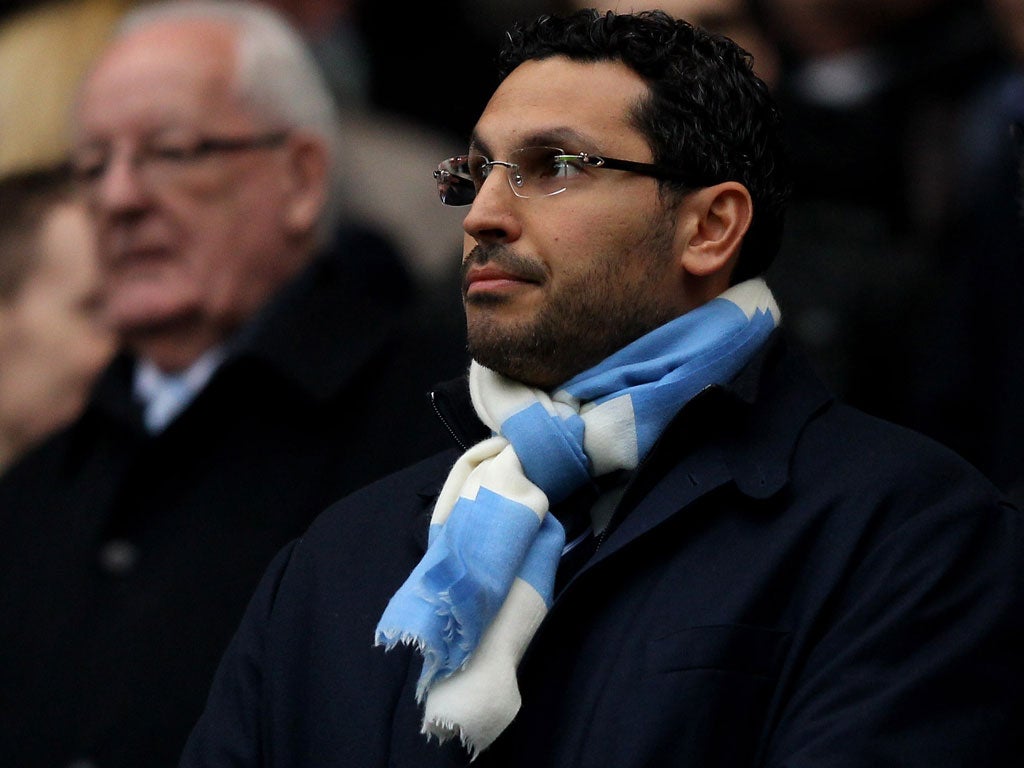Manchester City set to narrowly pass Uefa's Financial Fair play test, avoiding a ban from the Champions League next season
City reported losses of £51.6m for 2012/13, down from £97.9m the previous year

Manchester City are on course to narrowly pass Uefa’s Financial Fair Play test, despite another big increase in wages which their 2012-13 accounts have revealed to be £233m, up by more than £30m.
The salary bill means City, who beat Tottenham Hotspur 5-1 at White Hart Lane last night to go top of the league, are paying out £639,000 a day – or £26,000 an hour, £433 a minute – in wages. Two key new internal financial manoeuvres by the club, however, have brought in one-off revenue lifts of more than £42m, allowing them to restrict losses to £51.6m for 2012-13, and thus be on course to comply with FFP and avoid a ban from the Champions League next season.
The first is the sale of the club’s image rights to an external company, which has reaped City £24.5m. The second is the sale of City’s services to the other clubs which it owns – the New York FC franchise which it launched last year, along with the new Melbourne Heart franchise and Manchester City Ladies FC. That “sale of intellectual property to related parties” brought the club another £22.45m and is vital to City getting anywhere near complying with Uefa’s regime.
The club also took a major hit by paying off former manager Roberto Mancini and his staff last May. Mancini is understood to have walked away with £7.5m, though the accounts did not stipulate exactly how much in its breakdown of extraordinary one-off operation costs.
The losses reported yesterday are down from £97.9m in the previous year but still leave the club with a total loss of £149.5m across the past two years – a full £112.5m more than the £37m losses which Uefa said it would allow in those two seasons, as clubs prepare for FFP. That makes them a borderline FFP pass, as The Independent predicted two weeks ago. Though it will be for the Uefa Club Financial Control Body to decide whether the image rights and external services figures are acceptable, it seems highly unlikely that City – whose focus on FFP compliance has been so intensive – will fail to convince the organisation that they are.
Vital to City’s ability to bring the headline £149.5m loss figure down towards the allowable amount is the subtraction of wages for players signed before June 2010. That figure, which would include the huge sums paid out for leading players such as Emmanuel Adebayor, Carlos Tevez, Wayne Bridge and Robinho when previous manager Mark Hughes took City through the early development stage, might total £80m.
It will be supplemented by another hefty figure for stadium infrastructure work and youth development, which are also subtracted from the losses to reach the so-called “acceptable deviation” figure of £37m which Uefa allows.
The European governing body will rule in the next few months whether City have complied with FFP. The judgement will also include an assessment of whether City’s Etihad sponsorship deal – worth around £400m over 10 years and a significant part of City also reporting an annual turnover of £271m for 2012-13 – is a means for the club’s Abu Dhabi owners to inject cash artificially to reduce losses. The club denies that emphatically and insists the figure is in line with market rates.
Even if City do marginally fail to reach the £37m figure, their proximity to it would suggest that a dramatic Champions League expulsion is unlikely.
Daniel Geey, the competition and football law specialist at legal firm Field Fisher Waterhouse, who has advised clients and written extensively on FFP, said: “With City confident that they will comply with FFP, although the £150m headline aggregate loss figure seems high, this can be recalculated when Uefa reliefs like pre-2010 wages, infrastructure, community and youth development costs are removed. As such, the club for FFP purposes are then likely to be around the permitted €45m loss cut-off point.”
The club has not felt the need to offer any warning of the risk of non-compliance in the commentary which supports the 2012-13 figures. Though it is a common practice for businesses to provide advance warning of serious challenges in their operating environment, City’s position on that last night was that the annual report is a statement about the club, rather than the football landscape it operates within.
The club said that it was operating with zero financial debt for the first time, having paid off all remaining borrowings. Though City will need to break even in this financial year, they will be able to account for the new TV deal and the removal of the wages of players who needed huge financial incentives to join City’s “project” between 2008 and 2010, yet were then surplus to requirements. Tevez’s sale to Juventus last summer alone saved them £198,000 a week in wages, which would have added up to £17m across the remainder of his contract. The sales of Wayne Bridge, Kolo Touré and Roque Santa Cruz also allowed City to spend nearly £80m on Alvaro Negredo, Fernandinho and Stevan Jovetic in the close season.
Progress to the Champions League knockout stages for the first time will also increase revenues on 2012-13, when there was group stage elimination and not even Europa League football for City. The club also believes it can cross-sell sponsorship deals into its three global franchises.
Join our commenting forum
Join thought-provoking conversations, follow other Independent readers and see their replies
Comments